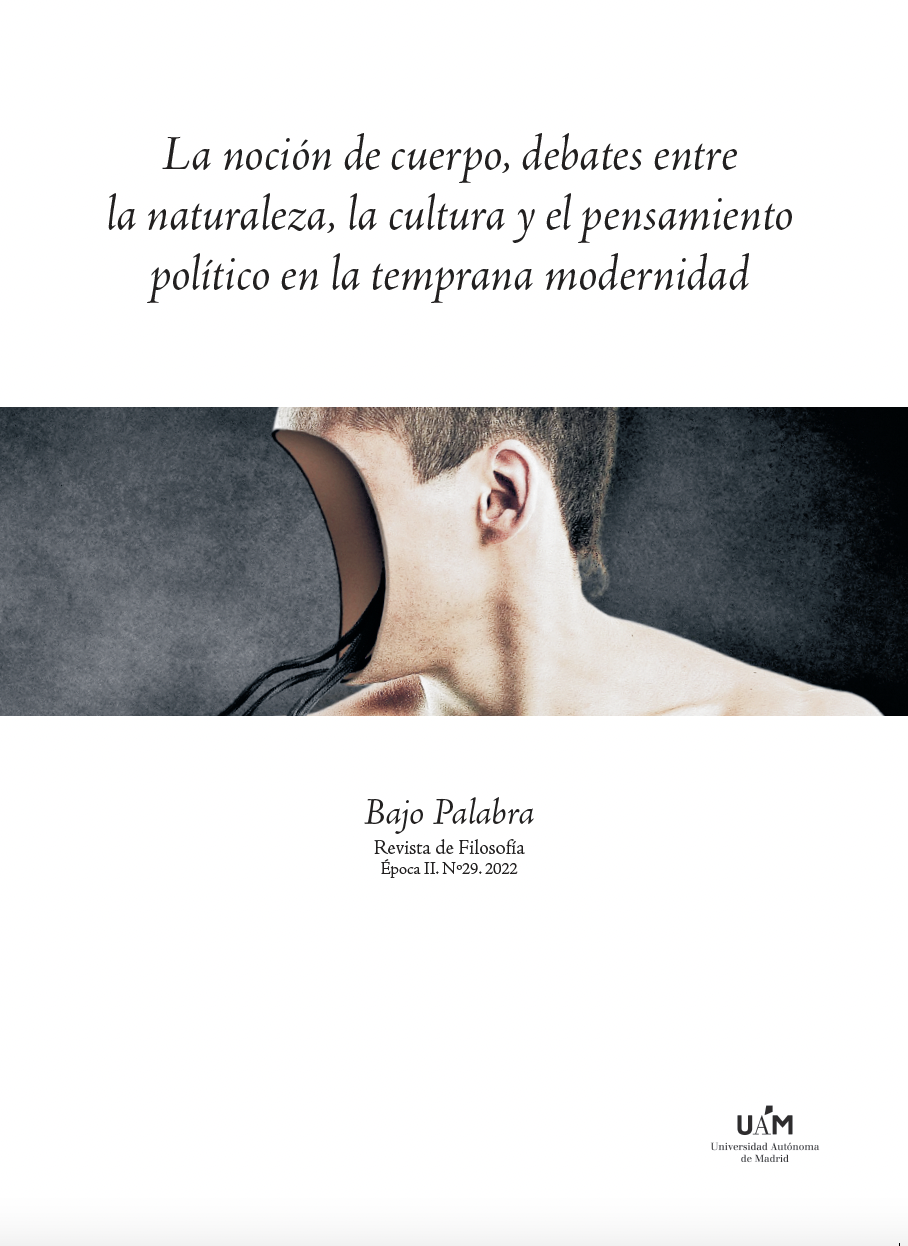Political Effects of a Material Soul. Passions and Reason in Elizabeth of Bohemia
Keywords:
materialism, soul, body, passions, summum bonumCopyright (c) 2022 Julián A. Ramírez Beltrán

This work is licensed under a Creative Commons Attribution 4.0 International License.
Abstract
The epistolary relationship that emerges
between Elizabeth of Bohemia and René
Descartes, in the past, used to be visited and
examined as a reading strategy that would
seek to clarify and explain the premises of
Cartesian and mechanical philosophy. Despite
this, the princess palatine stated a critical
vision on how the soul of the human being
can be determined by the corporeal spirits
to execute voluntary actions. Such criticisms
about the determination of the movements
between the soul and the body will have repercussions
on what can be called a materialist
and interactionist account. Some effects of
this material consideration of the soul can be
considered to imply: i. a cognitive qualification
on the relationship between reason and
passions; ii. the assessment of the strength of
passions in the search for a summum bonum;
and, finally, iii. the identification of a central
problem in modernity, the unpredictability
and impossibility to establish a summum bonum
(i.e. sovereign good) resulting from the
hostile relation between arrogant and modest
individuals. The effects of Elizabeth of Bohemia’s
preference for the materiality of the
soul then demonstrate central reading keys to
thinking about the formulation of political
theory in early modernity in connection with
Hobbes, Gassendi, and Machiavelli.
Downloads
References
Alexandrescu, V. (2012). What someone may have whispered in Elisabeth´s Ear.
Garber, D. y Rutherford, D. (Eds.), Oxford studies in early modern philosophy
(pp. 1-27). Volume VI. Oxford University Press.
Alanen, L. (2004). Descartes and Elisabeth a philosophical dialogue? Feminist
reflections on the history of philosophy (pp. 193-218). Springer.
Broad, J.; Green, K. (2009). A history of women’s political thought in Europe,
-1700. Cambridge University Press.
Becker, A. (2017). Gender in the history of early modern political thought.
The Historical Journal 60(4), pp. 843-863. DOI: https://doi.org/10.1017/
S0018246X17000061
Ciriza, A. (2010). A propósito de una controversia feminista: sobre ambivalencias conceptuales
y asuntos de disputa. Las relaciones entre cuerpo y política. Herramienta 45.
Clucas, S. (Ed.). (2018). A princely brave woman: Essays on Margaret Cavendish,
Duchess of Newcastle. Routledge.
Cunning, D. (2019). Margaret Cavendish: Essential writings. Oxford University
Press.
De Bohemia, I. (2007). The correspondence between princess Elisabeth of Bohemia
and René Descartes (Editado y traducido por L. Shapiro). University of Chicago
Press.
Descartes, R. (1977). Metafísicas, Meditaciones. Con Objeciones y Respuestas (Edición
y traducción, V. Peña). Ediciones Alfaguara.
Descartes, R. (1996) Oeuvres de Descartes (C. Adam y P. Tannery, Eds.). 11 vols
[AT-IV]. París.
Duncan, S. (2012) Debating materialism: Cavendish, Hobbes, and More. History
of Philosophy Quarterly 29(4), pp. 391–409.
Duncan, S. (2016). Materialism and the activity of matter in seventeenth-century
european philosophy. Philosophy Compass 11(11), pp. 671–680. DOI: https://
doi.org/10.1111/phc3.12358
Duncan, S. (2022) Materialism from Hobbes to Locke. Oxford University Press.
Ebbersmeyer, S. (2014). Épicure et argumentations épicuriennes dans la pensée
d’Élisabeth. D. Kolesnik-Antoine y M.-F. Pellegrin (Eds.), Elisabeth de Bohême
face à Descartes: Deux philosophes? (pp.171-183). Librairie philosophique J. Vrin.
Ebbersmeyer, S.; Hutton, S. (2021). Elisabeth of Bohemia (1618–1680): A Philosopher
in her historical context. Dordrecht Springer.
James, S. (1997). Passion and Action: The emotions in seventeenth-century philosophy.
Clarendon Press.
James, S. (2003). Margaret Cavendish: political writings. Cambridge University
Press.
Jeffery, R. (2017). The origins of the modern emotions: princess Elisabeth of Bohemia
and the embodied mind. History of European Ideas, 43 (6), pp. 547-559.
Lucrecio (2016). La naturaleza (Edición y traducción de F. Socas). Gredos.
Mintz, S. I. (2010). The hunting of Leviathan: seventeenth-century reactions to the
materialism and moral philosophy of Thomas Hobbes. Cambridge University Press.
Ojea Fernández, M. (2018). El saber femenino al margen de la academia correspondencia
entre Descartes y la princesa Isabel de Bohemia. Martín Clavijo, M;
Martín Martín, J. M.; García Pérez, M. I. (Eds.), Las mujeres dentro y fuera de la
academia (pp. 207-220). Ediciones Universidad de Salamanca.
O’Neill, E. (2005). Early modern women philosophers and the history
of philosophy. Hypatia, 20 (3), pp. 185-197. DOI: https://doi.org/
1111/j.1527-2001.2005.tb00494.x
Pacheco, A. (Ed.). (2008). A companion to early modern women’s writing. John
Wiley & Sons.
Paganini, Gianni. (2021). Elisabeth and Descartes read Machiavelli in the time
of Hobbes. Elisabeth of Bohemia (1618–1680): A philosopher in her historical
context (pp. 109-126). Springer.
Pal, C. (2021). A persistent princess: How Elisabeth of Bohemia constructed
her personal politics. Elisabeth of Bohemia (1618–1680): A philosopher in her
historical context (pp. 89-107). Springer.
Ramírez Beltrán, J. (2021a) Potentiae y felicitas en Thomas Hobbes: Una lectura
materialista sobre el poder soberano. Universidad de Buenos Aires. Tesis de maestría.
Ramírez Beltrán, J. (2021b) Thomas Hobbes y el liberalismo político. Una lectura
sobre la noción de felicidad. Ápeiron: estudios de filosofía, (14), pp. 17-48.
Rodis-Lewis, G. (1999). Descartes et les femmes: l’exceptionnel apport de la
princesse Élisabeth. Totaro, R. (Ed.), Donne filosofia e cultura nel seicento (pp.
-170). Consiglio Nazionale Ricerche.
Sutton, J. (2012). Soul and Body. Anstey, P. (Ed.), The Oxford Handbook of British
Philosophy in the Seventeenth Century (pp. 285-307). Oxford University Press.
Shapiro, L. (1999). Princess Elizabeth and Descartes: The union of soul and
body and the practice of philosophy. British Journal for the History of Philosophy,
(3), pp. 503-520.
Shapiro, L. (2007). Volume Editor´s Introduction. The correspondence between
Princess Elisabeth of Bohemia and Rene Descartes. University of Chicago Press.
Vardoulakis, D. (2019). Neo-epicureanism. Philosophy Today, 63(4), pp. 1013-
DOI: https://doi.org/10.5840/philtoday2020124308.
Wolfe, C. (2016). Materialism: A historico-philosophical introduction. Springer.
Wunderlich, F. (2016). Varieties of early modern materialism. British Journal for
the History of Philosophy 24 (5), pp. 797-813. DOI: https://doi.org/10.1080/09
2016.1223012.
